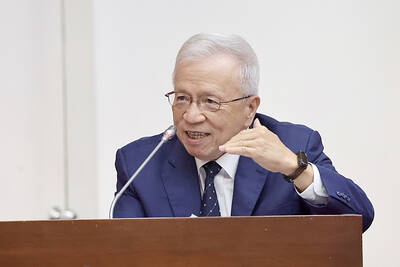Acer Inc (宏碁), the world’s second-biggest notebook brand, yesterday confirmed a worldwide voluntary recall of several models of its Aspire laptop, citing overheating problems.
The company initiated a global recall on Friday on five models because of a fault with the wiring inside the laptops, Evans Chuang (莊怡歡), from Acer’s public relations department, told the Taipei Times yesterday.
It has begun informing channel partners in Taiwan about the recall details and consumers can access the company’s Web site to determine if their products are affected, but declined to reveal how many units were expected to be recalled.
The affected models are the Acer Aspire AS3410, AS3810T, AS3810TG, AS3810TZ and AS3810TZG. The issue is only valid for models manufactured before Sept. 15.
“In the affected units, the microphone cable may overheat when extreme pressure is applied repeatedly to the left palm rest. As a result, the unit case may become deformed and the system may malfunction,” the company said on its Web site.
Acer is therefore voluntarily instituting a safety recall program to proactively replace the microphone cable in the affected units to eliminate any risk of overheating, it said.
Acer’s product advisory Web site allows customers to enter their laptop’s serial and identification numbers to check if their PCs require replacement.
Separately, Acer announced yesterday third-quarter consolidated sales figures at NT$167 billion (US$5.2 billion), up 5 percent from the corresponding period last year and a rise of 40 percent over the second quarter.
The company said in a statement that the worst of the recession was over and that its shipment would continue to post growth in the fourth quarter over the third.
“Although shortages of key components such as optical disk drive, DDR III and 500GB HDD will likely continue, Acer remains confident to achieve 10 percent sequential sales growth in the fourth quarter,” Citigroup said in a report yesterday.
One of the driving forces came from China, where Acer indicated that its market share should easily reach 10 percent by year’s end, from 8 percent in the first half of the year, the report said.
“Acer has been leveraging its global franchise to gain market share in China. After the management reshuffle in China, Acer has further strengthened relationships with channel distributors,” Citigroup said.
Sales contribution from smartphones — which will help increase Acer’s margin — will reach more than 10 percent in five years, up from contribution of three percent to 4 percent next year, it said.
Acer’s shares edged down 0.2 percent to close at NT$82 in Taipei yesterday.

JITTERS: Nexperia has a 20 percent market share for chips powering simpler features such as window controls, and changing supply chains could take years European carmakers are looking into ways to scratch components made with parts from China, spooked by deepening geopolitical spats playing out through chipmaker Nexperia BV and Beijing’s export controls on rare earths. To protect operations from trade ructions, several automakers are pushing major suppliers to find permanent alternatives to Chinese semiconductors, people familiar with the matter said. The industry is considering broader changes to its supply chain to adapt to shifting geopolitics, Europe’s main suppliers lobby CLEPA head Matthias Zink said. “We had some indications already — questions like: ‘How can you supply me without this dependency on China?’” Zink, who also

At least US$50 million for the freedom of an Emirati sheikh: That is the king’s ransom paid two weeks ago to militants linked to al-Qaeda who are pushing to topple the Malian government and impose Islamic law. Alongside a crippling fuel blockade, the Group for the Support of Islam and Muslims (JNIM) has made kidnapping wealthy foreigners for a ransom a pillar of its strategy of “economic jihad.” Its goal: Oust the junta, which has struggled to contain Mali’s decade-long insurgency since taking power following back-to-back coups in 2020 and 2021, by scaring away investors and paralyzing the west African country’s economy.

BUST FEARS: While a KMT legislator asked if an AI bubble could affect Taiwan, the DGBAS minister said the sector appears on track to continue growing The local property market has cooled down moderately following a series of credit control measures designed to contain speculation, the central bank said yesterday, while remaining tight-lipped about potential rule relaxations. Lawmakers in a meeting of the legislature’s Finance Committee voiced concerns to central bank officials that the credit control measures have adversely affected the government’s tax income and small and medium-sized property developers, with limited positive effects. Housing prices have been climbing since 2016, even when the central bank imposed its first set of control measures in 2020, Chinese Nationalist Party (KMT) Legislator Lo Ting-wei (羅廷瑋) said. “Since the second half of

AI BOOST: Next year, the cloud and networking product business is expected to remain a key revenue pillar for the company, Hon Hai chairman Young Liu said Manufacturing giant Hon Hai Precision Industry Co (鴻海精密) yesterday posted its best third-quarter profit in the company’s history, backed by strong demand for artificial intelligence (AI) servers. Net profit expanded 17 percent annually to NT$57.67 billion (US$1.86 billion) from NT$44.36 billion, the company said. On a quarterly basis, net profit soared 30 percent from NT$44.36 billion, it said. Hon Hai, which is Apple Inc’s primary iPhone assembler and makes servers powered by Nvidia Corp’s AI accelerators, said earnings per share expanded to NT$4.15 from NT$3.55 a year earlier and NT$3.19 in the second quarter. Gross margin improved to 6.35 percent,